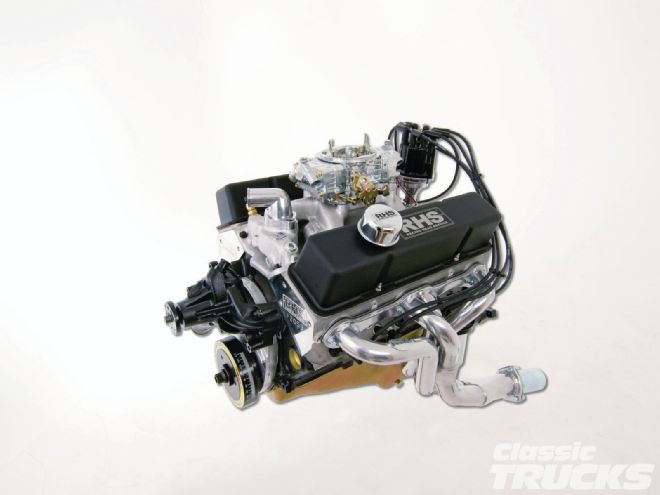
With today’s aftermarket manufacturers producing many combinations for the Chevy small-block, I took on the fun task of building a motor from scratch using a junkyard block for the base. And not just any junkyard motor either, we used an ’88 Chevy 350 with a one-piece main seal, cam thrust plate, four-bolt mains, and hydraulic cam in part one this buildup. I installed an Eagle Specialties stroked 383 bottom end kit (PN ESP-B13052L030) from Summit Racing. The 383 is given its name from the increased stroke and bore over a stock Chevy 350, and is a great way to gain cubic inches without having to go with a heavier big-block. I chose the 383 because of the increased horsepower, but more importantly for the torque. Torque, in most cases has the ability to get a heavy vehicle moving quicker from a dead stop than a same-sized motor with more horsepower but less torque. Remember the old saying, horsepower sell cars but torque wins races; well, this is especially true for trucks that tend to weigh more than the average hot rod car.
I will save the horsepower versus torque argument for another time. For the Junkyard Heap motor, I wanted a well-rounded motor that would produce 400+ hp and slightly more than 425 lb-ft of torque. Since I plan on driving the truck on the street, on the autocross course, and down the occasional dragstrip, the 383 had to be stronger in relation to its condition when it was a stock 350. The motor had to run on pump gas, because in this economy I thought it would be unfair to the reader that wanted to build a similar motor but found out the price of race gas after the fact. Let’s face it, pump gas is expensive enough. To keep the motor pump gas friendly, and run on 91-octane fuel, I wanted the compression ratio to be 9.6:1 rather than press the compression envelope and possibly risk detonation without the use of octane boosters or race gas.
When building or selecting a bottom end it is very important to choose the cylinder heads at the same time. Cylinder heads are measured in several different ways. The first determining factor to look at is the combustion chamber size. This is the area next to the valves and the spark plug hole. The combustion chamber has a direct relationship between the piston shape and deck height. Bigger is better right? Well, that’s not always the case with cylinder heads, especially when talking combustion chamber size. My RHS Pro Action heads have a combustion chamber size of 64 cc and if I ordered a set of 74cc heads instead it would have decreased the compression by a lot due to the 16cc D-shaped pistons that came with the Eagle Specialties kit.
If I were using a flat-type or dome-type piston with the same 64cc heads my compression ratio would have been higher than I wanted. Now, if I used a flat- or dome- type piston with the larger RHS 74cc heads, I could lower my compression ratio. In a nutshell, the piston shape, cylinder head cc’s, deck height, head gasket thickness, and cam size all play a role in pre-determining your choice of performance parts. I made sure to call the RHS tech line (800-999-0853) to have them help me select the right parts for my application.
Another common mistake when ordering heads is ordering too big of intake runners and valve sizes per the motor’s capability to pull vacuum. Remember, bigger is not always better. I ordered the smallest intake runners—180cc—that RHS has available for their aluminum heads. Without the help of the folks at the RHS tech line I would have ordered the 235cc heads, and suffered a loss of intake velocity and power because the motor would not be able to keep up with the amount of airflow. That’s not to say that 235cc heads don’t have their place, but they weren’t correct for my relatively low compression 383 stroker. With this particular 383, the RHS 180cc or 200cc intake runners work really well. CT